Chevrolet Cruze Repair Manual: Installation Procedure
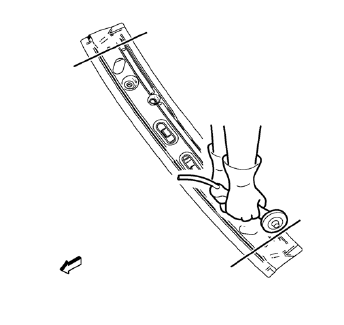
- Cut the roof front header panel in corresponding locations to fit the remaining original panel. The sectioning joint should be trimmed to allow a gap of one-and-one-half-times the metal thickness at the sectioning joint.
- Create a 50 mm (2 in) backing plate from the unused portion of the service part.
- Drill 8 mm (5/16 in) along the sectioning cut on the remaining original part. Locate these holes 13 mm (1/2 in) from the edge of part and spaced 40 mm (1 1/2 in) apart.
- Prepare all mating surfaces as necessary.
- Fit the backing plates halfway into the sectioning joints, clamp in place and braze to the vehicle
- Align roof front header panel.
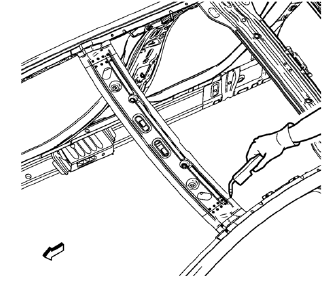
- Braze accordingly.
- To create a solid braze with minimum heat distortion, make 25 mm (1 in) stitch brazes along the seam with 25 mm (1 in) gaps between them. Then go back and complete the stitch braze.
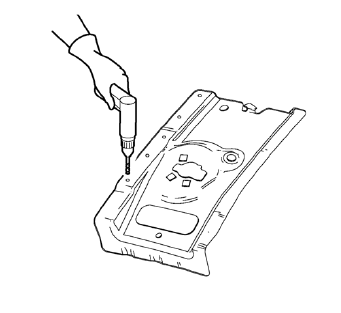
- Create 6 x 20 mm (4/16 x 12/16 in) slots for MIG-brazing along the edges of the roof panel front bracket right.
- Clean and prepare the attaching surfaces for brazing.
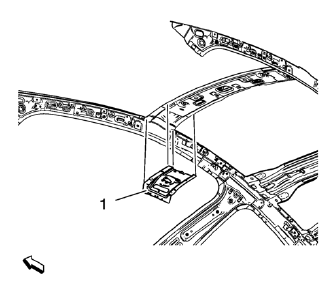
- Position the roof panel front bracket right (1) on the vehicle.
- Verify the fit of the roof panel front bracket.
- Clamp the roof panel front bracket right into position.
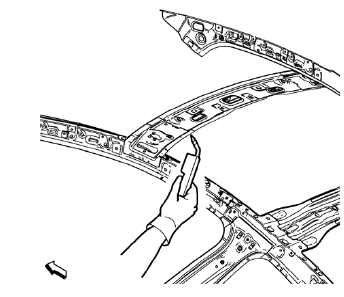
- Braze accordingly.
- Proceed the same way with the roof panel front bracket left.
- Apply the sealers and anti-corrosion materials to the repair area, as necessary. Refer to Anti-Corrosion Treatment and Repair.
- Paint the repaired area. Refer to Basecoat/Clearcoat Paint Systems.
- Install all related panels and components.
- Connect the negative battery cable. Refer to Battery Negative Cable Disconnection and Connection.
- Enable the SIR system. Refer to SIR Disabling and Enabling.
 Removal Procedure
Removal Procedure
Warning: Refer to Approved Equipment for Collision Repair Warning in the
Preface section.
Warning: Refer to Collision Sectioning Warning in the Preface section.
Warning: Refer to Glass and She ...
 Roof Rear Header Panel Replacement (MAG-Welding)
Roof Rear Header Panel Replacement (MAG-Welding)
Note: According to different corrosion warranties, only the
regional mandatory joining methods are allowed. ...
Other materials:
Removal Procedure
Warning: Refer to Approved Equipment for Collision Repair Warning in the
Preface section.
Warning: Refer to Glass and Sheet Metal Handling Warning in the Preface section.
Disable the SIR System. Refer to SIR Disabling
and Enabling.
Disconnect the negative battery cable. Refer to Batter ...
Engine Overheating
There is an engine coolant temperature gauge on the vehicle instrument cluster
to warn of engine overheating.
If the decision is made not to lift the hood when this warning appears, get service
help right away.
If the decision is made to lift the hood, make sure the vehicle is parked on
a le ...
Fuses and Circuit Breakers
The wiring circuits in the vehicle are protected from short circuits by a combination
of fuses and circuit breakers. This greatly reduces the chance of damage caused
by electrical problems.
To check a fuse, look at the silver-colored band inside the fuse.
If the band is broken or melted, repla ...
